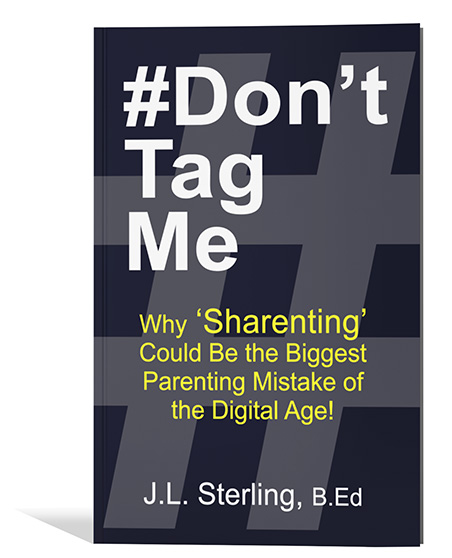#Don't Tag Me
Why 'Sharenting' Could Be the Biggest Parenting Mistake of the Digital Age
Purchase Options
🛒 Order your copy today from Amazon or Books.by and begin protecting your child’s emotional and digital identity while there’s still time to choose differently.
A parenting must read in today’s world
I love how the author holds up a mirror to our mistakes in this digital age while still being kind and holding space for the good intentions. I already limit my posts with my child to be shared with family only but after reading this I might also talk to my parents about how much they share about him online.
An eye-opening warning
This book makes you think about the impact of posting about kids online. It isn’t just another parenting book but a heartfelt wake-up call that talks about how sharing those ‘cute’ moments could actually affect your child’s self-esteem and privacy in the long run. It does make you think twice about hitting the upload button.
Read and reflect
Love this book. Highly recommend it for everyone, not just parents, to read. The digital world and social media have become deeply ingrained in our lives. Because of that, we often share real-life moments online without thinking about the consequences. Are we truly living our lives, or are we performing them? Awareness is the key. A book that makes you reflect.
When Privacy Becomes the Price of Parenting Online
By J.L. Sterling, B.Ed.
What if the photo you shared with love becomes the moment your child wishes you hadn’t?
We live in a world where childhood is documented before it’s lived — first baths, scraped knees, tear-streaked cheeks — all uploaded with good intentions. But behind the filters and captions lies a growing silence: children are watching, remembering, and quietly asking why.
In #Don’t Tag Me, educator and long-time classroom observer J.L. Sterling, B.Ed., opens a window into the emotional cost of sharenting, the digital habit of posting about your child without truly considering their future identity. This isn’t just about safety. It’s about respect, boundaries, and the right to grow up unseen by strangers.
🔍 What do children really feel about being “shared”?
📱 What happens to trust when their lives become content?
🧠 And what might we learn if we finally asked them?
Inside this eye-opening paperback:
- First-hand accounts from students living with online exposure
- The invisible weight of being a child with a digital legacy
- How social media reshapes parent-child trust over time
- Offline alternatives for meaningful, private connection
- A new conversation about dignity, consent, and growing up
One quiet sentence from an 11-year-old changed everything,
“I’m not in the photo; I’m in the comments.” That single moment invites a deeper pause; one you won’t forget. If you’ve ever posted in love, this book is not here to blame, it’s here to open your eyes. Before another upload writes a future, your child didn’t choose.
Insights & Free Downloads
YouTube Channel - JL. Sterling
Emotional Highlights from #Don't Tag Me
Six powerful moments that reveal the emotional reality behind digital parenting and the long-term impact of sharenting.
Guilt
“Children are being recorded before they are self-aware. Their growth is documented, captioned, and stored on servers they didn’t consent to. One day, they’ll scroll through their childhood — not as a memory, but as a feed.”
This moment captures the quiet guilt many parents may feel once they realize their online posts outlive childhood itself. It gently challenges the assumption that digital memories are harmless.
Empathy / Protectiveness
“One Year 5 student once told me, ‘I don’t mind being in the photo. I mind being in the comments.’”
A raw voice from a child that speaks volumes. It shows how even well-meaning digital gestures can feel invasive to young minds.
Fear
“Photos of children are harvested by strangers for uses no parent would ever consent to. Once uploaded, an image can be downloaded, altered, or sold — even if you delete it.”
This section raises the alarm about what happens behind the screen — a chilling reminder that the internet has no true erase button.
Regret
“By the time a child becomes a teen, they may already have a full digital identity — carefully curated by someone else. Their baby teeth, their tears, their first tantrums — all online.”
It evokes the regret of having shaped a child’s online presence before they had a voice in it — and how that digital self might not feel like their own.
Grief / Loss
“When a child’s real life is constantly narrated for an audience, what gets lost is the unfiltered experience — the kind that isn’t captured, posted, or approved. The child loses their moment.”
This passage reminds us that documenting a moment can sometimes replace living it. A child’s private reality becomes public performance.
Hope / Empowerment
“Privacy doesn’t mean secrecy. It means agency. It means giving your child the right to choose which parts of themselves the world gets to see.”
This quote reframes privacy as a form of love — a conscious gift of control and respect for the child’s future self.
This Isn’t Just a Book ~ It’s a Wake-Up Call
Every post tells a story. But only one person should decide what that story becomes.
Your child deserves a future that is their own ~ not filtered through your feed.
Let this book be your moment of pause.
Start the conversation. Make the shift. Protect the story that isn’t yours to tell.
